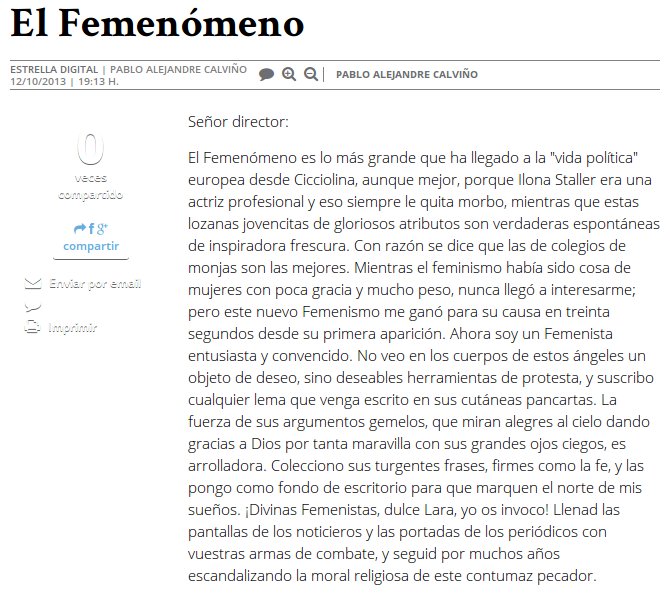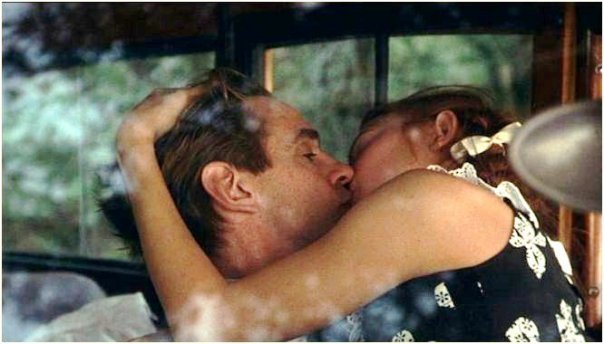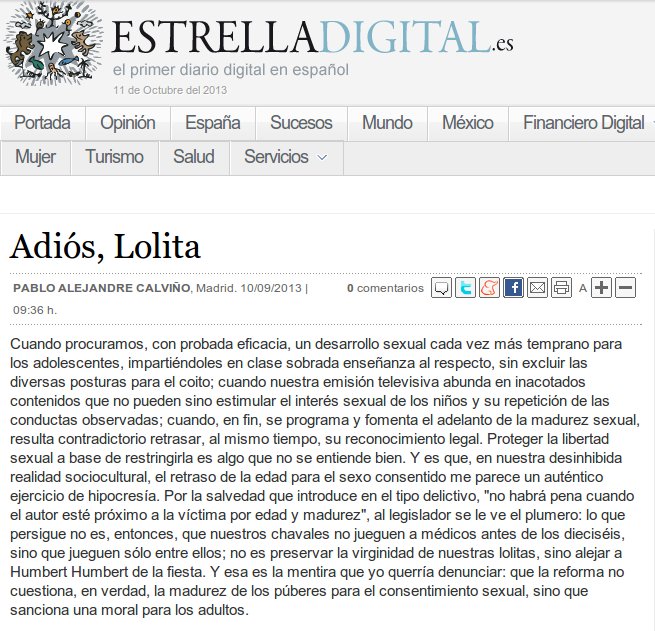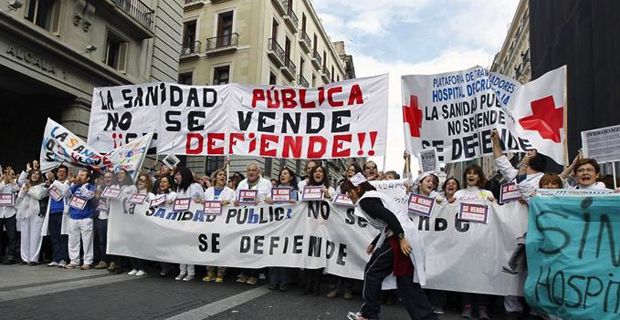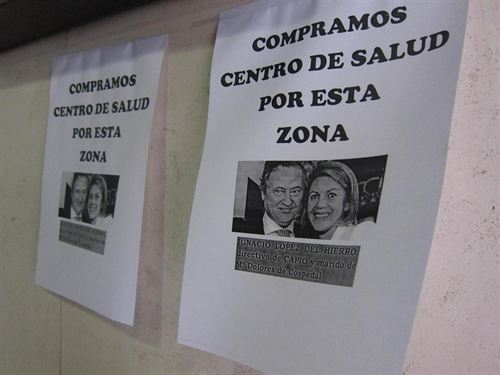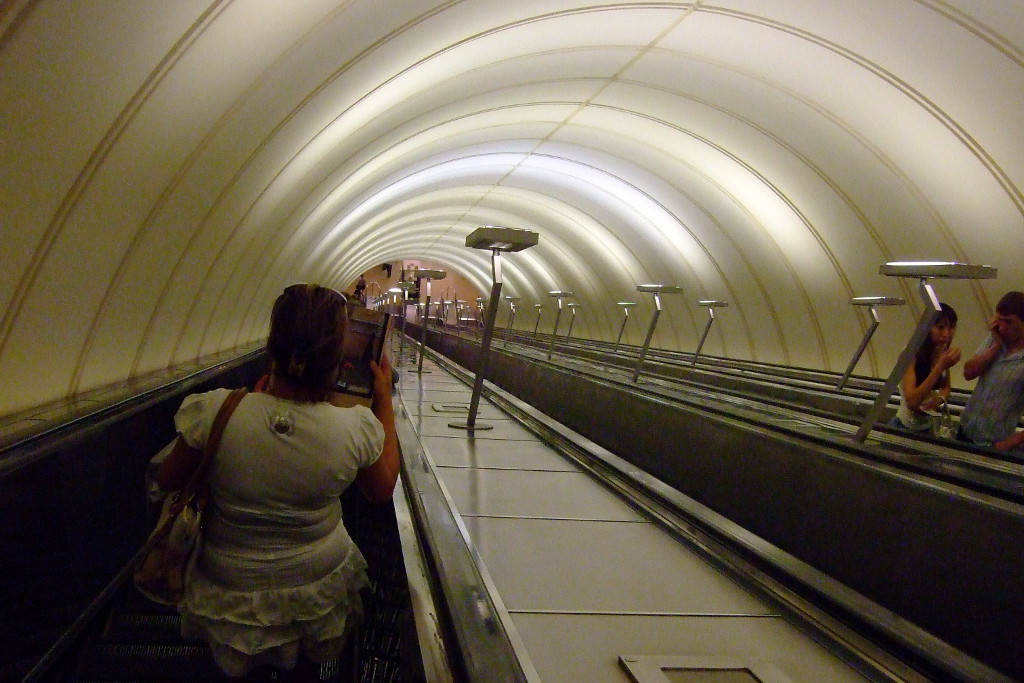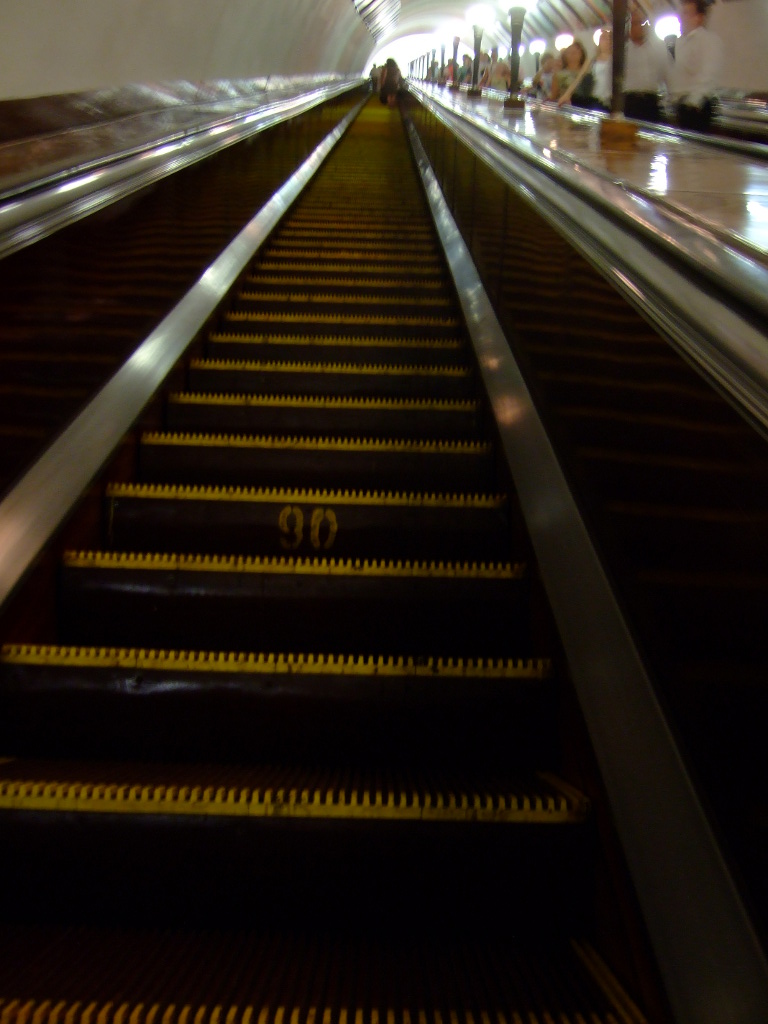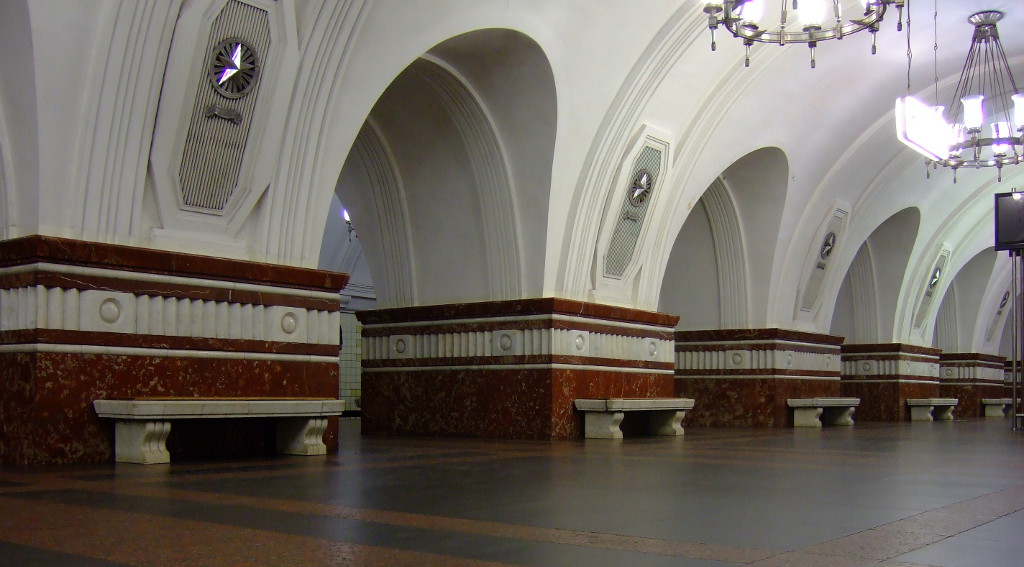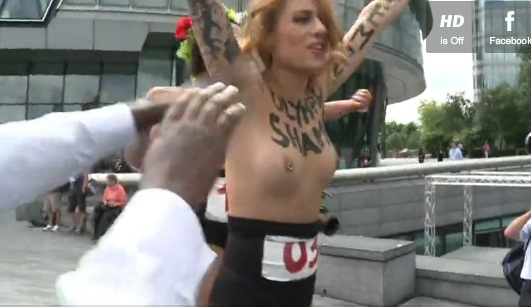
Rural church at Raduzhniy
The neighbouring railway stations Kazhanskiy and Yaroslavskiy constitute the main eastern Moscow hub, and that afternoon I was bound to the former for meeting Lyuda and taking together a train to Raduzhniy. But the Moscow underground is intricate and a bit complicated; its signs, especially for an outsider, are not always clear; and in those stations where two lines meet, their entrances can be–and often are–quite far from each other. This is why I mistook the exit and came up to the wrong train terminal, Yaroslavskiy. I was totally disorientated, time was pressing on me, and Lyuda had to come in a haste to the rescue from Kazhanskiy, where she had been awaiting me, and literally drag me there from where I was; therefore, only after a distressing obstacle race among the motley crowd which bustles at all hours between the two terminals were we able, just two minutes before departure, to jump into the Intercity for which she had already bought the tickets .
Quite a decent train it was, spacious and air-conditioned, that took two and a half hours to cover the more than one hundred miles east to Vladimir from Moscow. Yet, our destination was another fifteen miles’ flight south from Vladimir: we aimed the unknown, distasteful and strange town of Raduzhniy: a kind of bedroom community, isolated in the middle of the countryside; to be precise, in a clearing opened in the wood to such effect. It was originally founded (one might evey say «intvented») during the years of the Cold War by simply deforesting fifteen or twenty acres and spreading there, helter skelter, a few austere apartment blocks of striking ugliness to house the workers of a few adjoining facilities (contemporary of the town and inherent to it) built for the investigation and development of lenses, mirrors and other optical components for astronomical and who knows if also military purposes. At present, Raduzhniy consists of three or four wide and bare streets or roads, the deserted and walled up facilities to which the town owes its existence, the ugly housing blocks of the kwartel (districts) #1 and #3, plus some other buildings for servicing the population: school, shops, sports centre, church, etc. Nothing else. Around it, endless leagues of forest.  It has no industry or resources whatsoever. The discontinuation of the space race on the part of the two superpowers put an end to the research in telescopes, and nowadays Raduzhniy is only a bedroom community of Vladimir, though there are fifteen miles of field and woodland between them. (By the way: if some reader has wondered about the inexistence of kwartel #2, its construction was planned along the other two, but it was never carried out, nobody knowing for certain why.)
It has no industry or resources whatsoever. The discontinuation of the space race on the part of the two superpowers put an end to the research in telescopes, and nowadays Raduzhniy is only a bedroom community of Vladimir, though there are fifteen miles of field and woodland between them. (By the way: if some reader has wondered about the inexistence of kwartel #2, its construction was planned along the other two, but it was never carried out, nobody knowing for certain why.)
However, Raduzhniy retains up to this day an anachronistic singularity which is as absurd as useless: it still remains a «restricted town» as was originally conceived, presumably for security and industrial espionage reasons. Therefore, theoretically, only its inhabitants or duly authorized persons may enter; and, to this end, the government still keeps a barrier with a police checkpoint at its gate, on the only road that links the town with the rest of the world.
In a practical sense, there are only two possible ways of reaching Raduzhniy: by bus or by car. As for the former, they all must stop at the gate, where a policeman boards and requests the passengers to produce their permits… except if the bus is so crowded that some passengers travel standing on the aisle, in which case—this is the funny point–they are ordered to get off, so that the policeman can easily control only the seated passengers, and then, after the others board again unchecked, the bus is allowed to cross the gate and enter the town. Utterly absurd, isn’t it? One way, then, to underground enter Raduzhniy is to take a bus in Vladimir on a peak hour, boarding the last in the queue for making sure you won’t have a seat. However, it might well happen that, by the time you arrive to the barrier, enough passengers have stepped off along the way for everyone else being checked at the gate, and you may get caught. Now, what about entering by car? Well, the trick here is much easier, as the «security hole», equally absurd, is however better suited for unauthorized people: car passengers are only checked if the vehicle doesn’t show on the windshield the corresponding pass; but if it does, then you’re not even required to stop at the barrier: the car has a cleared way without any kind of control.
So, upon arrival to Vladimir, Lyuda and me headed for the road to Raduzhniy and, first, tried our luck with the bus; but, after disregarding a couple of them for lack of passengers enough to make sure we wouldn’t be checked at the barrier, we decided to try grab a car. Luckily, in Russia is customary among a large number of drivers to casually use their cars as taxis; it’s a kind of handy «paid hitchhike»: you stand on the sidewalk or the road shoulder and flag down the approaching cars until some driver stops by–usually in less than three or four minutes. You tell him where you want to go, and if it’s anywhere along or around his destination, agree on a price (which is often almost fixed by habit) and jump in. (Digression: perhaps this tradition is based on the solidarity and mutual trust derived from not yet distant communism, on the laws of symbiosis and–above all–on the shortage of vehicles; but I’m afraid that, alike hitchhiking, it won’t outlive the pressure of consumerism. Indeed, the so-called progress, along with the entailing individualism of «advanced» societies, will bring among people distrust enough to kill this practice.) But, for the moment, it’s so deep-rooted that in some places there is an unmarked «car stop», settled by custom, where people who aim certain destinations queue for taking a car, and there’s no need to flag them down: drivers know.
And such was the case where Lyuda and me stood; so, even though only a few of the cars showed in the windshield the Raduzhniy pass (which Lyuda well knew, as she lived there for years), we didn’t need to wait long for somebody to pick us up: a lady on her way back home from work, driving a nice and tidy car. The stereo played such a nice music, and I was so tired, that I fell asleep during the journey. Twenty minutes later, we entered without any problems the Forbidden Town. When we got off the car, we handled the lady one hundred rubles and she protested that it was more than the usual «tariff» for this trip, but we insisted and she finally took the money.
 Actually, it was only me who needed to uderground enter Raduzhniy. Lyuda had a permit, as she had been living there most of her life; and this is the answer to what some reader may have wondered by now: what had brought me to visit such a dull place? Well, sheer curiosity for knowing the town where Lyuda grew up, and the thrill of sojourning the same family appartment she had dwelled with her parents since their distant arrival from Kyrguistan (during the USSR times) until their sad and recent demise. Actually, her father had been one of the physicists who worked in designing the mirrors and lenses for whose developement the Soviets had «made up» Raduzhniy. And it’s because of these fictional undertones that I found engaging to stay for a few days in that small flat of so fairly socialistic, whose taste to slavic tradition, to plain and humble life, still lingered on: the wooden floored living and bedroom; the plastic coveredel tiles in kitchen and toilet; the damp patches on the worn wall paper; solid woodwork; gas and water piping re-painted half a dozen times; huge radiators; old-style electrical appliances, yellowing from age; Formica-lined furniture in the ugly design, somewhat cubist, of the 70’s; bath and toilet in tiny separate cubicles; cheap plastic ornaments hanging on the walls; some Orthodox icons; old photos turning sepia; several shelves full of Russian literature and plenty of engineering books; two old armchairs worn out from excessive use; a vacuum tube television and even an old valve radio. Traces of a hundrum existence, unadventurous and simple, yet probably happy.
Actually, it was only me who needed to uderground enter Raduzhniy. Lyuda had a permit, as she had been living there most of her life; and this is the answer to what some reader may have wondered by now: what had brought me to visit such a dull place? Well, sheer curiosity for knowing the town where Lyuda grew up, and the thrill of sojourning the same family appartment she had dwelled with her parents since their distant arrival from Kyrguistan (during the USSR times) until their sad and recent demise. Actually, her father had been one of the physicists who worked in designing the mirrors and lenses for whose developement the Soviets had «made up» Raduzhniy. And it’s because of these fictional undertones that I found engaging to stay for a few days in that small flat of so fairly socialistic, whose taste to slavic tradition, to plain and humble life, still lingered on: the wooden floored living and bedroom; the plastic coveredel tiles in kitchen and toilet; the damp patches on the worn wall paper; solid woodwork; gas and water piping re-painted half a dozen times; huge radiators; old-style electrical appliances, yellowing from age; Formica-lined furniture in the ugly design, somewhat cubist, of the 70’s; bath and toilet in tiny separate cubicles; cheap plastic ornaments hanging on the walls; some Orthodox icons; old photos turning sepia; several shelves full of Russian literature and plenty of engineering books; two old armchairs worn out from excessive use; a vacuum tube television and even an old valve radio. Traces of a hundrum existence, unadventurous and simple, yet probably happy.

Family pictures
As to Lyuda, she was orphaned while still in her thirties and, being an only child, she didn’t have any relatives left but for a bad-tempered bossy grandmother, quite indifferent to her, who lived in Ukraine, and an uncle in the nearby Vladimir. Having almost no friends, her life went by in the greyest, most helpless and stoical loneliness.



 One of those days we visited Vladimir. It’s a millenial city that had its golden age during the XIIth century and then, after the downfall ensuing the invasion at the hands of Tartar and Mongolian hordes commanded by Batu Khan, still kept some ascendancy until the XIVth century. In those times, it was one of the capitals of Russia as well as a see, but nowadays it’s only characterized by the tourism related to its past preeminence and historical buildings (it’s one of the cities of the Moscow «Golden Ring»)
One of those days we visited Vladimir. It’s a millenial city that had its golden age during the XIIth century and then, after the downfall ensuing the invasion at the hands of Tartar and Mongolian hordes commanded by Batu Khan, still kept some ascendancy until the XIVth century. In those times, it was one of the capitals of Russia as well as a see, but nowadays it’s only characterized by the tourism related to its past preeminence and historical buildings (it’s one of the cities of the Moscow «Golden Ring») but, mostly, for being an industry, energy and military center of medium significance. And, though spoiled by the ubiquitous chimneys of the thermal power station, it has a nice and friendly historical: located on a hill, abounds in stately buildings, old churches, large old wooden mansions, broad parks and graceful gardens. From its southernmost side, right on top of the hill and devoid of high buildings, endless leagues of woodlands can be contemplated.
but, mostly, for being an industry, energy and military center of medium significance. And, though spoiled by the ubiquitous chimneys of the thermal power station, it has a nice and friendly historical: located on a hill, abounds in stately buildings, old churches, large old wooden mansions, broad parks and graceful gardens. From its southernmost side, right on top of the hill and devoid of high buildings, endless leagues of woodlands can be contemplated.
 We seized the opportunity for carrying out the bureaucratic procedure of my registration, that Soviet entelechy still rules the life and the administrative formalities for Russians and foreigners alike. Its only purpose is to report to the authorities about the official whereabouts of both citizens and tourists. And, though registration is theoretically mandatory for everyone, it actually seems to be nothing else than a way for granting the policemen some arbitrary margin, a legal excuse for taking bribes at will. We did this paperwork in an old post office, whose premises were spacious and bright, with large windows and wooden floor and furniture, and where the employees loafed around shamelessly prattling while the pacient citizens submissively awaited to be serviced. I merely paid the tax, sat on a chair and watched around, because the Lyuda took charge of the whole procedure.
We seized the opportunity for carrying out the bureaucratic procedure of my registration, that Soviet entelechy still rules the life and the administrative formalities for Russians and foreigners alike. Its only purpose is to report to the authorities about the official whereabouts of both citizens and tourists. And, though registration is theoretically mandatory for everyone, it actually seems to be nothing else than a way for granting the policemen some arbitrary margin, a legal excuse for taking bribes at will. We did this paperwork in an old post office, whose premises were spacious and bright, with large windows and wooden floor and furniture, and where the employees loafed around shamelessly prattling while the pacient citizens submissively awaited to be serviced. I merely paid the tax, sat on a chair and watched around, because the Lyuda took charge of the whole procedure.
Besides this visit to Vladimir, we didn’t do much during our short sojourn in Raduzhniy. We once rambled in the nice surrounding forest, but there were so many mosquitoes swarming in the bush that we had to give up a second stroll. We went to fetch water, like in the fairy tales, to a nearby spring among the trees that poured just a trickle of water because of the drought;  but most of the time we walked up and down, gloomily, along the unsightly, desolate and stark streets, without sidewalks of the bleak town, gardenless, benchless… There was nothing to do there, not a cinema where to kill a couple of hours after dusk, not a cafeteria where to leisurely enjoy a cup oftea, not a bar where to go for a beer. Still, I keep a pleasant memory of those quiet and somewhat melancholic days.
but most of the time we walked up and down, gloomily, along the unsightly, desolate and stark streets, without sidewalks of the bleak town, gardenless, benchless… There was nothing to do there, not a cinema where to kill a couple of hours after dusk, not a cafeteria where to leisurely enjoy a cup oftea, not a bar where to go for a beer. Still, I keep a pleasant memory of those quiet and somewhat melancholic days.
Our return to Moscow was somewhat eventful. Firstly, the mashrutka we took for going from Raduzhniy to Vladimir broke down half-way and we had to wait for the next one, of course paying a new ticket, as each of these small buses is privately run and, therefore, neither the second one would take us for free nor the first one would be willing to refund us the money. Secondly, when coming into the city, we got stuck in a traffic jam. It was rush hour and we hadn’t taken into account this circumstance when working out our schedule. So, once again we had to run and arrived just in time for not losing the train.
This time it was a second rate one for Russian standards; probably a third for western Europe. It was unclean, had no air conditioning, the seats were uncomfortable, and stopped at every station on the way. So, we had to endure three and a half hours of slow, hot and tiresome traveling. However, thanks to this experience I was able to witness one of the miracles of Russian engineering: the anti-ventilation windows. Despite all of them in the carriage being open, the air within didn’t stir, same when we were stopped or in motion. On the other hand, needless to say that, being a cheaper train, there were plenty of shady-looking passengers: your archetypal dirty and drunk vagrant, the stereotype shirtless and disrespectful youngsters in their way to get drunk, and a chance over made-up lady, fleshy and smelling alcohol.
While, among these specimens, I was vainly trying to have a nap, just behind me I heard a voice asking in English something like: «excuse me, I think I’ve overheard you speaking English». Whomever the man was—I thought–he could only be addressing to me. As our seats were back to back, I turned my head half way towards my shoulder just to see, at but a few inches out of the corner of my eye, another eye looking at mine out of its own corner. I answered that, indeed, I was talking in English. The voice asked back: «but are you a native English speaker?» As I wasn’t very interested in a chat over my shoulder with a guy who had addressed to me in such an improper way, I was happy to inform him that I was Spanish and that, besides, my English was quite poor. However, this didn’t seem to deter him from keep talking; his question had been meant to simply break the ice, but he actually wanted to practice a bit, as, apparently, he was forgetting much of his English since he came back from the U.S., where he had been working some time ago. «The typical bore», I thought. However, I soon changed my attitude when I heard the natural and modest way with which, after I asked him about his job in the States, he answered me with a smile: «washing dishes».
He was a nice chap of around thirty and, for not having used the English language in a long time, he spoke it quite fluently and with a more than acceptable accent. He told me about his experience in North America: how he had migrated there with a group of Russian labour hand, how they had been working in different occupations with remarkable performance, and how he remained a bit longer after his fellow countrymen retrned to Russia. Probably he also told me some other facts about his life and–I guess—he asked me about my job and what I was doing in his country. After a while, in almost the same carefree and sudden way he had used for starting our chat, he thanked me the conversation and finished it. A few minutes later, in one of the stops, two drunkards get on the coach and sat by me, and Lyuda urged me to move away. I silently complied, despite not wanting my new friend to think that he had bothered me to the point of changing seats; but later on our sights crossed with a reciprocal smile, and I felt relieved. When he got off the train, two or three stops before Moscow, we waved our hands to each other. What a pity that life has turned us so wary to even become reluctant to talk with a stranger travel mate!
Finally, sweaty and tired, Lyuda and me alighted to an evening Moscow inmersed in a static atmosphere that zealously kept the day’s heat irradiated by asfalt, brick and concrete. It was still twilight when we crossed the threshold of our hot appartment. We opened the windows, but not a puff of air came in.



